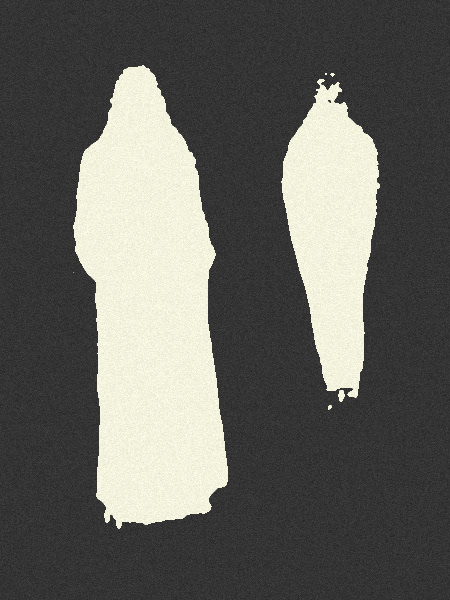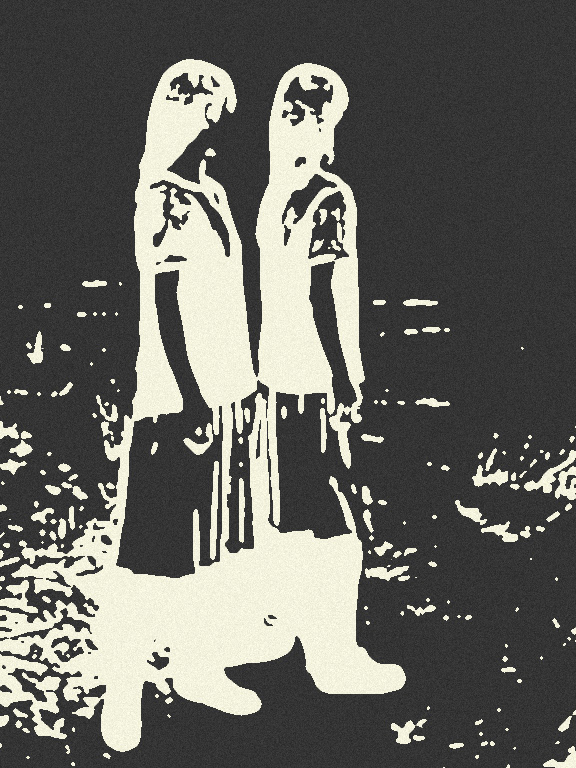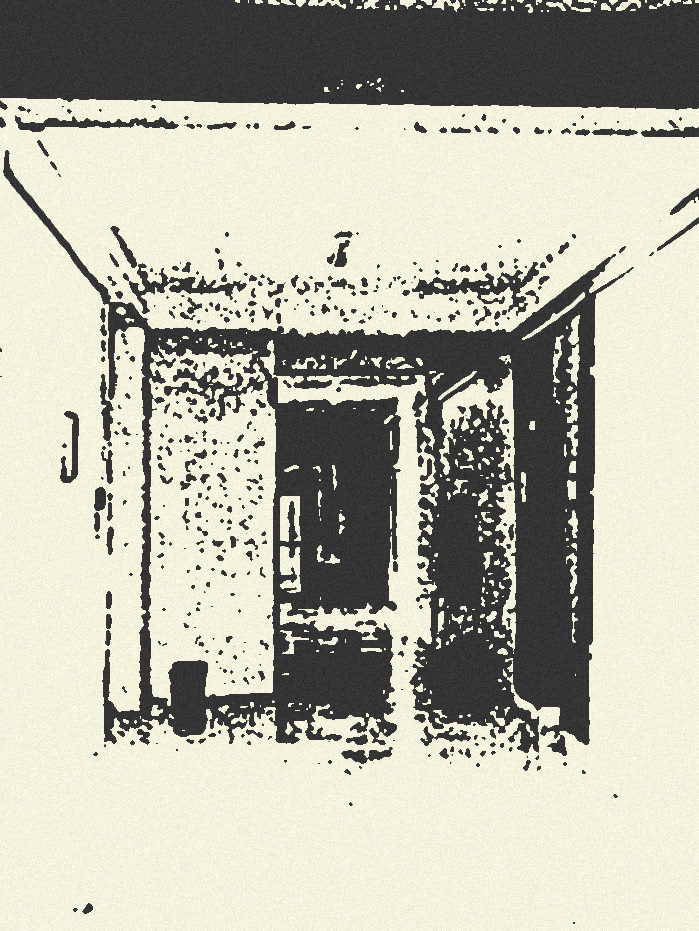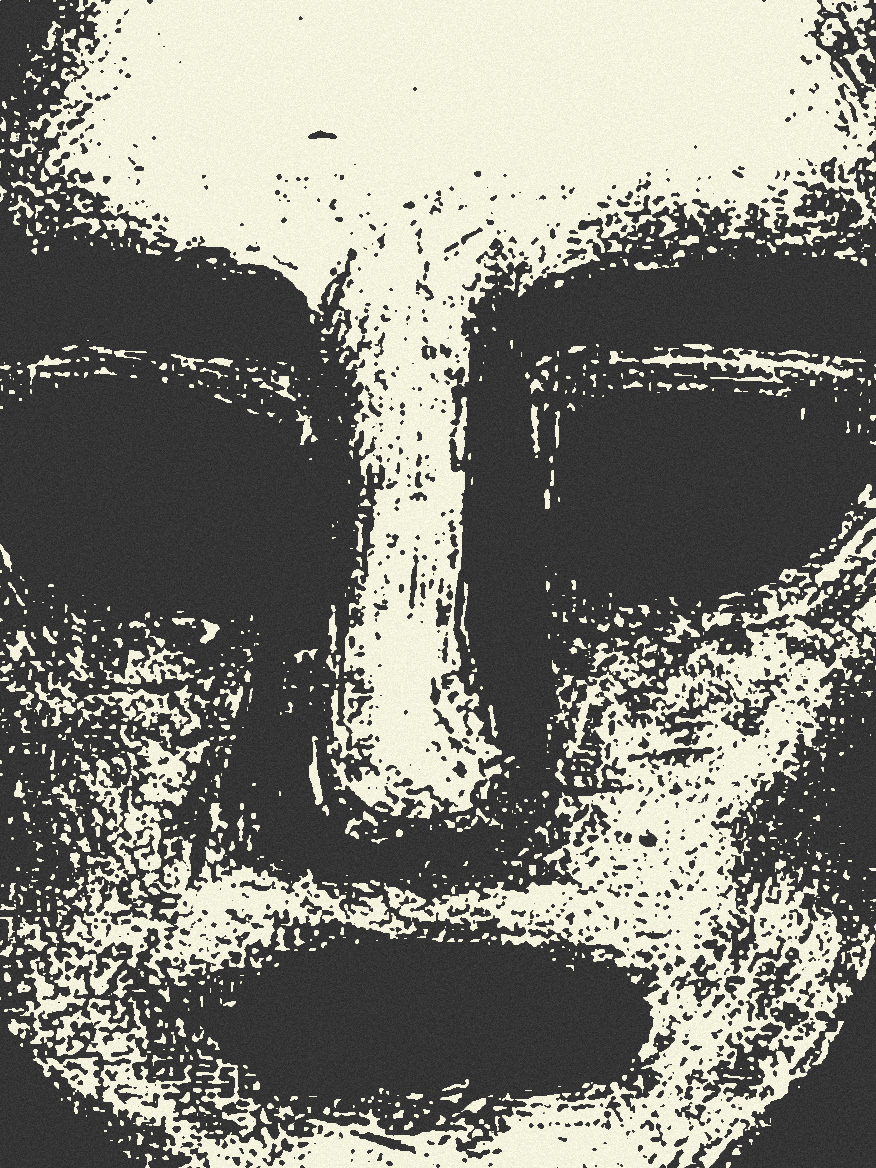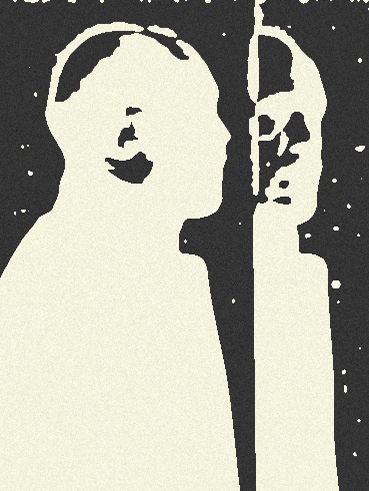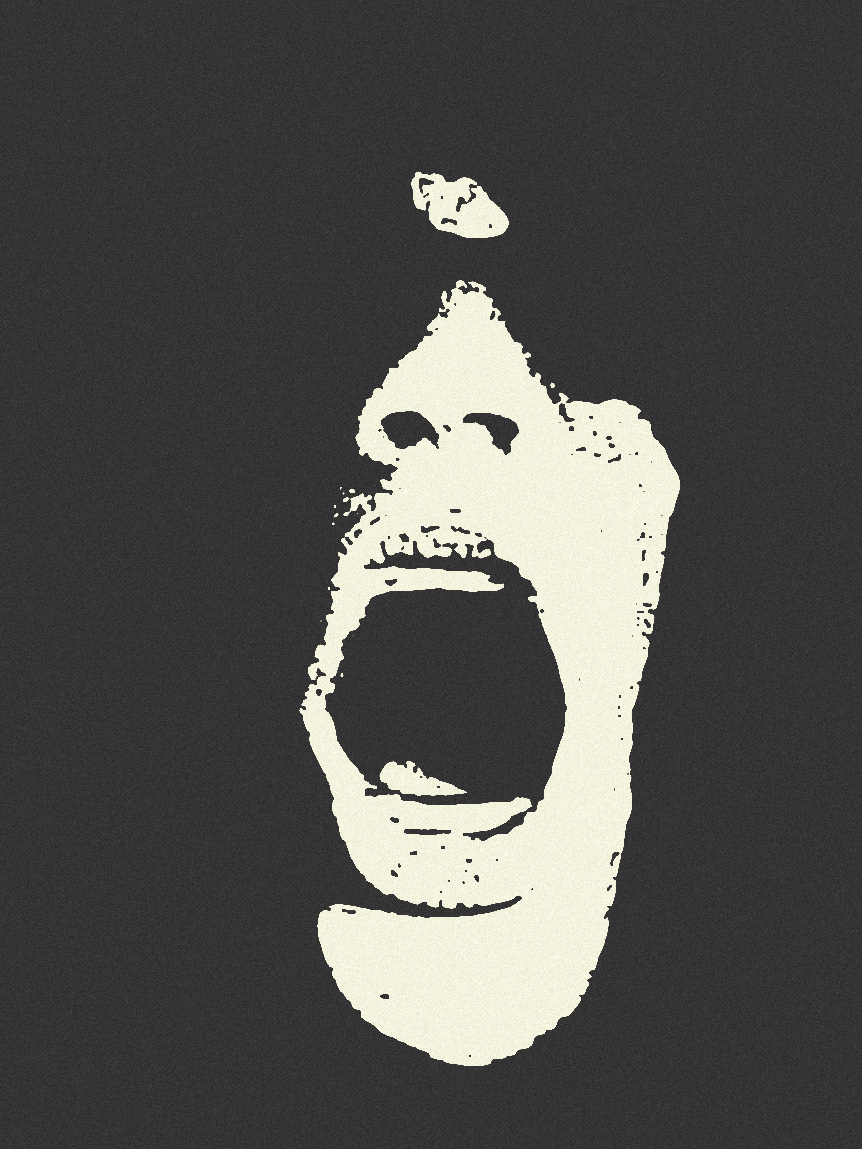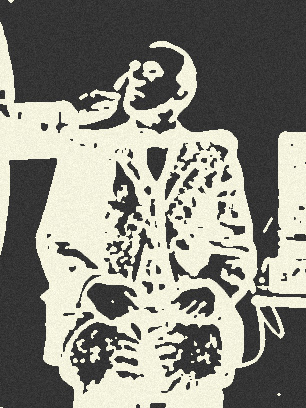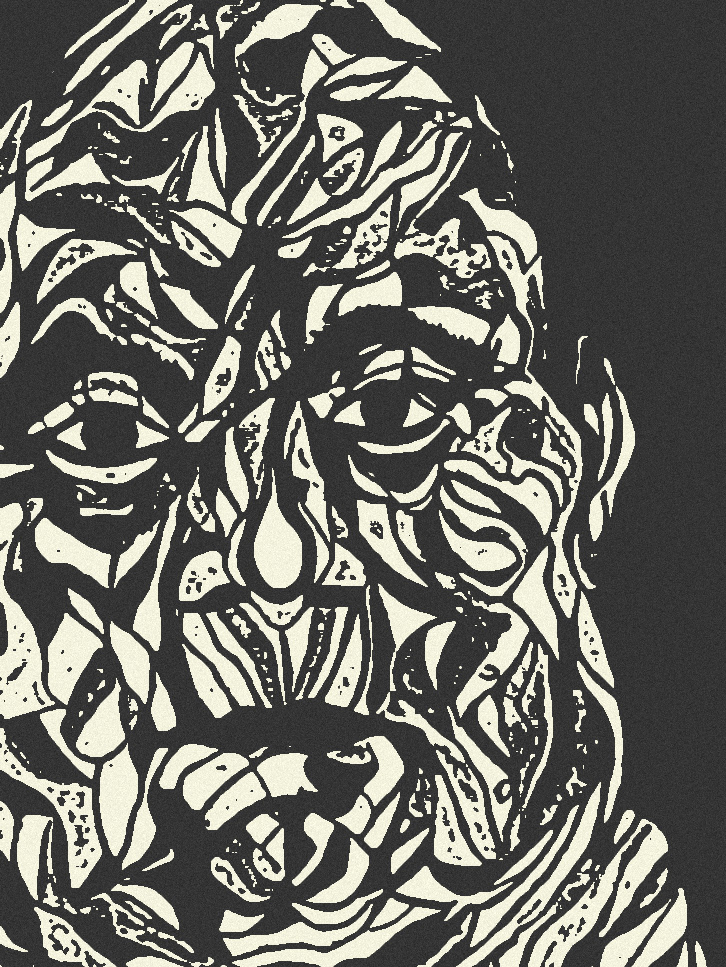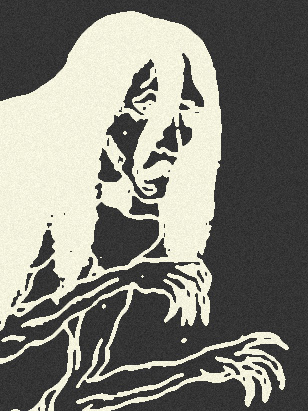✷
The rope pulled at Calypso’s waist. She staggered then stumbled as she clawed her way up the hill with Phoebe tied below. They had been searching for Alawisha, their younger sister, since her disappearance the day before. Hunger, thirst, and fatigue were ignored as panic pushed them to the edge of collapse. When sleep grabbed her, Calypso dreamt of Crow Barn.
Sweat burned her eyes. She carried a knife swathed in rags and kept it tucked into her belt. A cloth bag was strapped across her shoulder. Her feet wrapped in bark and tied with hemp made the ascent slippery. She plodded on, looking at burnt hills and toppled chimneystacks, tombstone markers for homes, homes her grandmother had told her once nestled in green hills covered with orange poppies and goldenrod. Calypso had been enchanted by tales of California’s central coast. Once there were streams of fresh water, an ocean to swim and surf in, vineyards, cows that grazed along miles of farmlands and Monterey Pines silhouetted against a blue horizon. There had been a highway that connected villages with towns and towns with cities.
It was dangerous to let her thoughts drift when they were being hunted. Since Alawisha disappeared, Calypso leashed herself to Phoebe.
Phoebe stopped and turned to brush away their footprints. She had a satchel of blankets and rags fastened to her hip. The strain from pulling her and the mountain’s incline caused Calypso to reel backwards and fall.
She tumbled down the hill and landed a few feet from her sister. Looking up, she saw Phoebe’s blotchy sunburnt face. She had dirt in the crease of her arms and broken fingernails. Grime and twigs intertwined in her reddish-brown hair, making her look much older than her nineteen years.
“It’s almost noon.” Calypso checked her body to make sure no bones had broken. “We have to get out of the sun.”
“I’m not going in Crow Barn.”
“Neither am I. There might be plants. Shade. Something to hide under.” The farmhouse was out of sight to drifters and gangs. Anyone who roamed the central coast had heard the stories and would dare not go up there. “Whoever took Alawisha is looking for us,” Calypso said, licking her blistered lips. She stood and picked up the extra rope.
“But the dream told you nothing,” Phoebe said.
“It was a feeling. More than that, something I must do.” There was little to lose, between starvation and thirst and hope as barren as the hill she climbed.
The sun’s scorching temperatures required that they sleep in the day and gather plants by moonlight. With the atmosphere stripped, the satellite was stunningly clear. It hung like a ticking clock. She looked around. Their voices could wake stalkers.
She trudged on, and scratched her matted hair.
“You’ve no black at all,” Phoebe said in a low voice.
“We’re going to find her.” After Alawisha’s kidnapping, her hair turned white with guilt.
“Granny talked about ice cream. How it cooled you off.”
“No more talking.” Hunger and heat could make them careless. She remembered how her father scolded her after her nose was broken in a fight with three girls over a handful of pine nuts.
“An animal doesn’t take chances when it knows it can’t win. Neither should you,” he had said.
She was glad he wasn’t around to know about Alawisha. Her shame stung. And what would he have thought about them going up to Crow Barn?
She paced herself so as not to sprain an ankle, or worse, as she labored up the slope.
Calypso had heard the stories how Jackson Hammond hanged himself from the rafters inside the barn, his eyes pecked by crows. A year after, his wife hanged herself. The corpse, found weeks later, twitched from the rafter as vultures, crows and rats gnawed at the feast. Neighbors ransacked the Hammonds’ ranch house then set it afire. Embers glowed in the shadow of Crow Barn. They advanced to the barn, raided the inside then torched the planks. But the building refused to burn. People ran screaming. Talk of ghosts and hauntings bristled even the cynics. The news about the suicides and tangle of sensational rumors about murders and sex slaves built one on top of another until Crow Barn was crowned evil, the devil’s crypt.
Calypso gazed at the trail that once was a highway. The rising of the seas transformed the coastline. Ponderous salt rivers strangled whatever terrain crossed its path.
She saw no one and heard nothing but the wind. Gusts could mutate into spontaneous typhoons that swirled, separate dwarf-twisters, zigzagging, churning life into ash.
Last evening high in the hills the three of them had searched for food. After scavenging for herbs, Alawisha sat meditating in a hollow overlooking Morro Bay. Calypso crouched to collect cactus leaves, and when she turned, Alawisha had been snatched. She heard no struggle or cries, and saw no crushed weeds or footprints. What happened to their little sister?
When their father died, Alawisha consoled them. She told them their love for him would always live in his heart just as his love for them lived in theirs. In the most harrowing times, her sweetness prevailed. “We should never doubt the goodness of man,” she often said. Her passionate belief in a future full of wonder reminded Calypso of the tales their grandmother told them. Alawisha’s kidnapping was a swinging heartache in the rafters of her mind.
Calypso neared the crest of the hill and saw the toppled chimneystack. She crawled on her stomach. Her leather breast guards scooped dirt. Her legs cramped. She peered over the ridge. Her spine prickled.
Crow Barn watched.
The planks were bleached rat gray. Their gapped tooth fangs sucked the wind and metal sheets the color of dried blood patched portions of the building. Crow Barn stood protected by the yawning hills that surrounded it.
The rise and fall from the slopes cast a veil across the cavernous pit. Calypso looked north and saw the chimneystack with a border of fallen bricks. To the south was a scorched pick-up truck.
A grating screech prickled the hairs on her neck. She looked at the peak of the barn. A plank fell. She shrieked.
“Sister!”
The rope dragged her backwards. Calypso turned and yanked on the line, her thin arms lifting Phoebe. The effort made her dizzy, but she hauled her sister up until they clasped hands.
“What was it?”
“A loose board that fell.”
Phoebe clung to her as she gaped at the barn.
Calypso carried the extra rope.
“Let’s make sure no one’s up here,” she said, releasing the cord.
They took a wide path around the barn, passing the pick-up truck and a tractor without wheels, and came to a halt. Phoebe screamed. Calypso muffled a cry. A heavy oxidized shackle poked like a tongue out of an incinerator. Next to the oven was the blanched torso of a cow and what looked like the bones of a human foot.
They continued walking and saw a woodchipper on its side. A cluster of dandelions grew nearby.
They ran to the plants.
“Do you think it’s safe to eat?”
“We’ve eaten them before.”
“But here?” Phoebe asked. “What if the soil is poisoned?”
Calypso yanked a stem from the ground. “It looks okay.”
“It might kill us.”
“Or we die of starvation.” She bit off a leaf of the flower and chewed. “They’re no different from any other.”
“It's too soon to tell.”
Calypso pulled twine from her bag, dug out the rest of the flowers and tied them. “Let’s keep our minds open. It might not be all bad up here.”
“I’m not so sure.”
They completed circling the barn and headed east where the house once stood. The chimneystack was half its original size.
Calypso picked up bricks and poked into crevices. She tossed aside blocks, looking for bottles, containers—anything useful. A plot of color beyond the stack drew her attention. She went over to inspect. Growing on the low incline of the hill was a patch of green with tiny strawberries poking through the leaves.
“Come here.”
“What?”
“Come here.”
“Uh-uh. I don’t want to be scared.”
“It’s strawberries.”
“Don’t tease.”
“I’m not.”
Calypso stared at the fruit. Mystified. Nature’s red was enough to give thanks. But to eat?
Phoebe ran over. Gaped. “It can’t be.” She crouched. “We’re being tempted by something evil.”
Calypso ran her fingers over the green leaves and gently picked a strawberry.
“Look!” Phoebe cried.
A strawberry appeared in its place.
“How can that be? How can any of this be?” Calypso felt around for moisture. “How do they grow without water? Then spring to life after another’s picked? Even if they’re poisonous,” she lowered her voice, “what we’ve seen is a miracle.”
“Or wicked,” Phoebe whispered.
“We’ll only know if I taste it.”
“And you die?”
“Just a nibble,” Calypso said.
“No!” Phoebe snatched the fruit from her sister’s hand and tossed it away.
“How will we ever know if we don’t taste it?”
“I’ll eat it,” Phoebe said, running her hand across her forehead.
“We can come back and test them later. There must be groundwater, maybe a spring or well.” Calypso burrowed her fingers into the earth. She shoveled until she was certain that no water flowed. “It’s miraculous. How do they grow without water?”
“I tell you everything up here is cursed.”
Calypso brushed off her hands and wondered what Alawisha would think.
She looked at the barn. It waited, enticed, challenged her to come close. She stared at the thing that had become a legend, stood and walked to the barn in a clash of curiosity and dread.
“You’re not going in?”
“Just looking.”
Through the slats, she saw blue sky, and as she moved, light skipped, darkness sprinted. Phoebe ran up beside her and glanced around.
“Do you hear that?” Calypso whispered.
“What?”
“Listen.”
“I don’t like being this close.”
“Hear it?” She heard a low buzz, the current broken with hissing then a hum. She stepped closer to the barn.
Their father had told them about electricity, and one night, she and her sisters watched as dark clouds filled the sky. Ancient hooked fingers streaked light to the ground.
“That’s it!” their father shouted. “Electricity!”
A rumbling thunder followed. The sisters squealed as they ran into the arms of their father.
He taught them about nature, that everything on the planet had the seed of life within it.
Calypso wondered if Crow Barn was more than an evil dungeon that wouldn’t burn.
Phoebe gripped her. “I hear it. We should get out of here.”
“I want to look in through the slats.”
“You’re crazy.” Phoebe tightened her grasp on the rope. “Please,” she said. “I don’t wanna lose you too.”
“You’re not going to lose me.”
“This place is evil.”
“The strawberries?”
“A trap.”
“But who’s trapping us?”
“Crow Barn,” Phoebe said.
“Bad things happened here. But it doesn’t mean the land is evil.”
“You don’t know.”
“Neither do you.” Calypso jerked the rope to give her more slack.
She walked toward the bleached, uneven planks. The crackling and buzzing grew louder. She was within a few feet when a low drone stabilized. A pulse throbbed.
Calypso approached the barn. She felt a lurch, a sudden heartbeat through the soles of her feet. The drone became a purr inviting her in.
She peered inside, glimpsed patches of grass and plots of solid darkness. A bat flew out of an opening.
She shrieked.
Phoebe screamed. She ran to her sister and wrenched Calypso back. “Let’s go.”
“Not yet.”
“You promised.”
“Look. On the ground.” She pushed Phoebe to the planks. “In the middle, toward the back. It’s glassy like water.”
“We’re not going in.”
“If it’s water, I am.”
“All the stories. The things that have happened.”
“If a tub of water sat right here, would you drink?”
“I don’t know.”
“Imagine if the trap were the other way around. That every food and drink you could imagine was here, but no one would eat because of the past. The trap is your mind.”
Phoebe untied the rope and threw it at her sister. “If you go in there and something happens to you, what about me? Then I’ve lost two sisters. I’ll have no one I can trust. You promised.”
Calypso picked up the rope. “Instant strawberries? Electricity? Maybe water? Bats we can eat. Maybe rats and mice.” She held out the rope. “I have to find out if it’s water.” She extended her arm and saw tears in her sister’s eyes. “Oh Phoebe, c’mon, we mustn’t be afraid. Don’t let fear separate us.”
“Then I’m going with you.” Phoebe grabbed the cord and knotted it around her waist.
“No. Stay out here. Watch.” Calypso turned sideways and squirmed between two boards. “Keep the rope tight. And our voices low.” She slipped into the barn.
“What’s it like?” Phoebe whispered.
“Dark.” It was as if darkness consumed the light that streamed in from outside. When her eyes adjusted to the dim, she scanned the roof and saw four crows lined on a beam. They stared down at her. “There’s food.” One of them squawked. Above the crows high in the rafters, she saw the small upside-down shadows of bats. Calypso was swift and deadly with the knife. “Plenty of food. If I can kill them before they fly away.”
“What else?”
“Ssh. Be quiet.”
She smelled mold. The damp made her clammy. The ground felt mushy, and her sandals sank into the soil. When she lifted her feet, the clay sucked. Popped. Water. She squinted and saw patches of grass. Mushrooms. Nails jabbed from the walls.
Her toes touched something solid. She knelt to examine. Bones. They were small, and she wondered what rodents lived among the crows and bats. As she rose, something hairy scampered across her feet. She flinched. A rat scurried. She took out her knife, listened, aimed, and hurled the dagger. The rat fell.
Calypso walked over, gave thanks for the food, pulled the knife from the neck, wiped the blood with her rag, picked up the rat, and looped its tail through her belt. It dangled upside down. Blood dripped on her thigh.
In the center of the barn, the glassy surface appeared as a pond. Moss skirted the border. She moved in slow thoughtful steps. Combined spiderwebs shimmed from the center of the barn all the way to the east corner, with feathers, spiders and bugs mangled in the silk threads. The rat’s furry body bumped against her leg. Crows preened. Bats rustled.
Calypso was almost there when she saw something floating.
She tread as if walking over the dead, the barn a graveyard of fear as the planet withered and rolled on its side, the seas making their way inland. That was it. How could she be so stupid? Saltwater that no one could drink.
She stepped to the bank and fainted.
“Sister, sister!”
She heard a faraway plea.
“Ca-lyp-so!”
Something crawled around her waist. It dragged her across the ground, yet she was powerless to stop it.
She woke in a fog too dense to see through, then a furious wail—not hers. It was Phoebe.
Calypso roused.
Phoebe howled.
They held each other as they stared into the pond at the beautiful face of their sister, Alawisha. She was alive. Her golden eyes gleamed, and her hair was like a desert in flames.
“What is this?” Calypso asked. Her heartache ended and the wave of tears that never broke now streamed down her face. Back and forth she rocked, from the sheer joy of finding her sister to the utter horror of where she found her.
Alawisha spread her lovely arms. The water rippled, her smile beguiled, her spirit seemed filled with luminous wonder. “Come with me. You’ll be safe.” Her arms disappeared, and her face receded. The water touched her cheeks. “This is the real world.”
“You're not Alawisha,” Phoebe screamed. “How could this be? Someone is tricking us.”
“It’s not a trick,” Alawisha said.
“You’re in a pool of water. In Crow Barn,” Calypso said. “What are we to think?”
“Don’t you trust me?”
“No,” Phoebe shouted.
Calypso leaned forward. “Who kidnapped you?”
“I wasn’t kidnapped.”
“Then what happened?” Phoebe asked.
“I was sitting in the hollow, my eyes closed, and asked Mother Earth to provide for us.” She smiled. “She did. I saw an opening and went through. I’ll show you.”
It was just as Calypso remembered, on the hill, but the rest was too fantastic. “Why don’t you come out?”
“What for, when real happiness is inside?”
“What are you talking about? Inside, outside. Come with us,” Phoebe said. “We’re your sisters.”
Calypso put her hand on Phoebe’s and leaned forward.
“Where you go—what’s it like?”
“Like Granny used to tell us. Only a million times happier.” Her body swayed under the water, causing waves in the pond. “We can all be together. There’s ice-cream, Phoebe.”
The older sisters glanced at each other.
“Why did you leave without telling us?” Phoebe asked.
“It just happened. I’m here, sisters. To get you.”
Calypso glanced at Phoebe. “The dream led us here.”
Phoebe nodded.
“What do you think, Sister?” Calypso asked.
“She’ll never come out. I’ve never had her kind of faith. Or yours.”
“I won’t go in without you,” Calypso said.
“I want to, but I’m scared.”
“Then let’s stay tied.” Calypso tossed the rat and her bag aside. She unknotted the rope and retied the cord, leaving enough for Alawisha.
“Tie it around you. So we’ll all be together.”
“We don’t need to do that to be together.”
“Go ahead. Do it,” Calypso said.
The pond swished and swirled as Alawisha wrapped it around herself.
Calypso eased herself into the pond. The cool water cleansed the filth off her body. It soothed her sores. She looked at her sister.
“It feels good. We’ll be together. Come in.”
Phoebe untied the strap of her bag, laid it on the ground, and slid into the pond.
Alawisha plunged beneath the surface. Calypso and Phoebe followed into the depth where they soared over a grove of trees. The rope unraveled. Calypso swooped, dove, rocketed. Guilt vanished, and she saw her long hair turn jet black. She looked over at Phoebe. Her mouth opened in awe. Alawisha was laughing. Calypso sailed on a divine seamless joy and rode the spearhead of love. The sisters floated and glided until momentum spiraled, and they hovered over a blue sea. They skimmed above green pastures of purple wildflowers and rows of vineyards. Calypso breathed in the sweet fragrance of rosemary. She landed on a hill with orange poppies and goldenrod, listened to thunderous waves and saw the windswept branches of Monterey Pines. A cool breeze touched her skin, with Phoebe and Alawisha beside her.
✷
“Crow Barn” was originally published by MetaStellar and in The World of Myth (Oxford University Press)
DC Diamondopolous is an award-winning short story and flash fiction writer with hundreds of stories published internationally in print and online magazines, literary journals, and anthologies. DC's stories have appeared in: Progenitor, 34th Parallel, So It Goes: The Literary Journal of the Kurt Vonnegut Museum and Library, Lunch Ticket, and others. DC has two published collections of short stories: "Stepping Up" and "Captured Up Close" (20th Century Short-Short Stories). She was nominated twice for the Pushcart Prize and twice for Best of the Net Anthology. She lives on the California coast with her wife and animals. dcdiamondopolous.com

